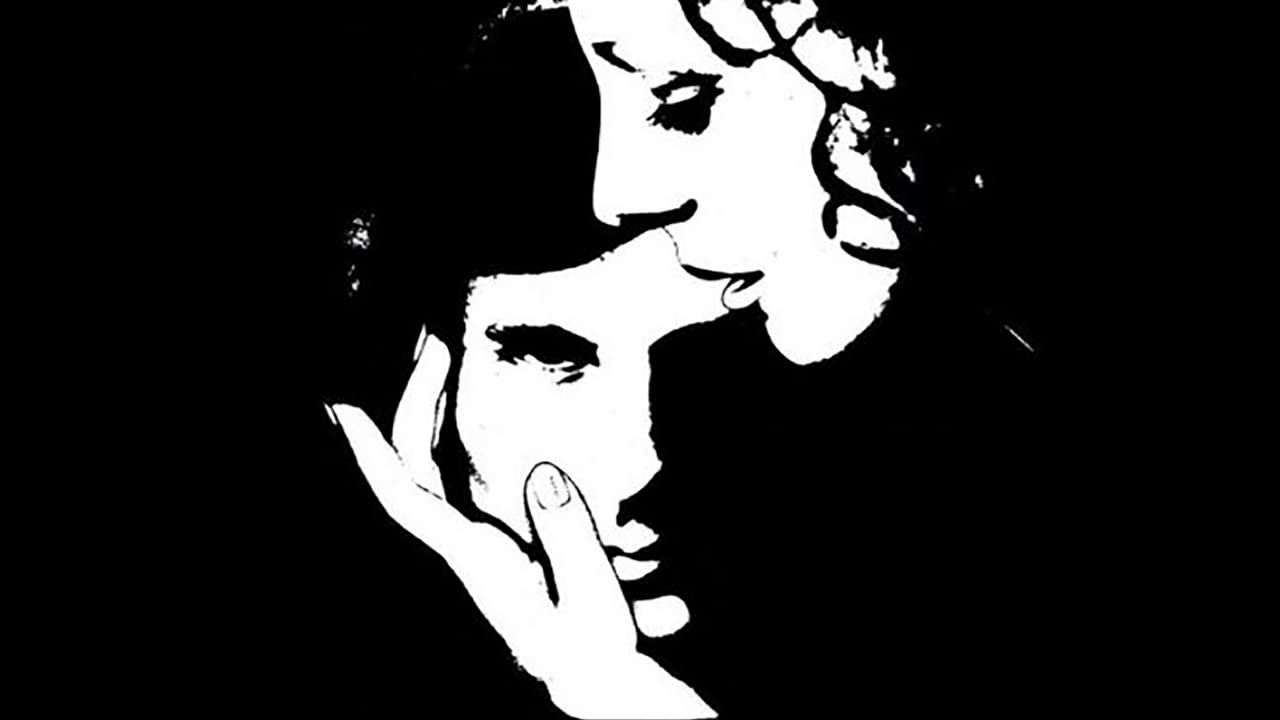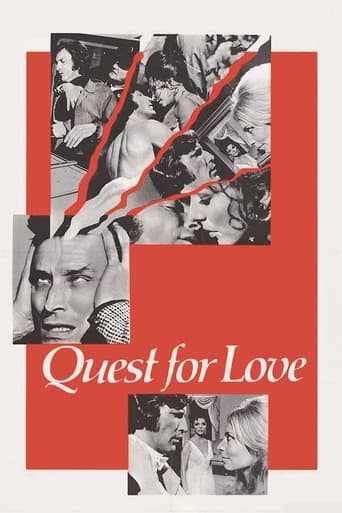

Quest for Love is a science fiction romance set in an alternate world. Physicist Colin Trafford (Tom Bell) during an experiment is sent across an alternate Britain in the 1970s which has not gone through World War 2, there is no war in Vietnam, man has not gone to space or even conquered Everest.Here Trafford is a noted but philandering playwright with a troubled marriage to former ballerina Ottilie (Joan Collins.) The new Trafford at first dazed and confused becomes immediately smitten with his wife and aims to woo her again but something is not right with her health. Trafford finds himself going back to his own world and tries to track down the same woman.Tom Bell was known for playing intense even bitter characters, so it is nice to see him play tender and romantic, although we do get angry and perplexed in the early scenes. Bell is matched by Collins who plays the alluring wife married to a fickle man in a nicely understated but charming way.The film loses a bit of impetus at the latter part of the film and also ends abruptly as if the budget ran out.
... View MoreBased on the 1954 short story "Random Quest" by John Wyndham, this is one of the few screen adaptations which I thought was better than the original work. The short story and the film follow the same basic storyline: due to a failed experiment, a physicist named Colin Trafford is sent to a parallel universe where World War II never happened and his counterpart is a successful author and complete bastard with a beautiful wife named Ottilie Harsham, with whom he falls in love almost immediately. "Random Quest" is a good story and has some fascinating ideas but, at 43 pages, it was too short to fully explore the potential of the material. Wyndham could have easily gotten a full novel out of the idea. Ottilie only makes a brief appearance in the story, meaning that it is hard to get involved with Colin's search for her once he returns to his own universe. The film, however, rectifies these problems.The lead roles are played by Tom Bell and Joan Collins. As the initially mystified Colin, Bell gives an excellent, understated performance. He is occasionally prone to angry outbursts but he is a good and decent man whom you care about more and more as the film progresses. Joan Collins is simply marvellous as Ottilie, playing the role of a neglected, emotionally abused woman to perfection. When she realises that Colin is not her husband, Ottilie experiences true happiness for the first time since her marriage and Collins is wonderful in these scenes as well. I have never seen her give a better performance. The film has two extremely strong supporting cast members in Denholm Elliott and Laurence Naismith and it also features nice but fairly small appearances from Ray McAnally, Juliet Harmer, Simon Ward, Sam Kydd and Bernard Horsfall.The screenplay is written by Terence Feely, who is probably best known for his work on numerous cult TV series of the 1960s and 1970s. As he wrote two of my favourite episodes of "The Prisoner" ("The Schizoid Man" and "The Girl Who Was Death"), my hopes were high and the film did not disappoint. He was able to flesh out Wyndham's characters considerably. Colin and Ottilie feel like real people throughout. Colin's characterisation is particularly good as the differences and similarities between him and his unseen counterpart are well illustrated. Giving Ottilie a fatal heart condition was a brilliant idea on Feely's part as it gave Colin's search for her counterpart in his own universe a greater sense of urgency and a greater moral dimension than existed in the short story. It also served to make her even more unattainable and eliminated the problem of her once again being the victim of her husband's emotional abuse once the two Colins switched back, something which undermined the short story's happy ending. All of these changes are to the benefit of the film.On the sci-fi side, Feely not only incorporated some of Wyndham's ideas about the differences between the two universes such as nuclear fission being still only theoretical and the League of Nations still existing but included some of his own such as JFK being alive and the new Secretary-General of the League of Nations, heart transplants being unknown to medical science, abortion still being illegal throughout the UK, televisions being more primitive, Mount Everest still being unconquered and - my personal favourite - Leslie Howard still being alive and still acting into his old age. These are fascinating little touches, many of which are Feely's subtle way of acknowledging the technological and social progress which followed World War II in reality. Furthermore, the film is extremely well directed by Ralph Thomas, the elder brother of "Carry On" director Gerald Thomas.Overall, this is a wonderful, understated sci-fi love story which reminded me of "Somewhere in Time", my tenth favourite film of all time.
... View MoreWhat a powerful and thought-provoking movie. It was refreshing to see Joan Collins in such a different role! She plays such a sweet and gentle person! The whole idea of the movie, alternate realities, is a subject I think many people are intrigued with. I know I feel it is entirely possible - or rather, I am HOPING it is!!! Also, it was done so well, the switching back and forth between the two worlds, that it felt seamless. The intensity builds as the scientist's learns of problems he alone can remedy with this switching of realities. It's a race in time. I saw this film in the 80's. I had turned on the TV one night, very late, and it was just starting. For years now, I have been trying to find it, to watch again. It left me with such a dreamy, anything-is-possible type of feeling!
... View MoreTo my considerable annoyance, every time this movie has been shown on TV I haven't had my VCR ready to record. I've probably seen it about three or four times, on the proverbial rainy afternoons when little-regarded films are broadcast. It's been described by other IMDb reviewers as a sci-fi love story, and it certainly is that. But it's also a rare foray for a mainstream movie into counterfactual history. (In this respect it resembles novels such as Kingsley Amis's "The Alteration", Keith Roberts' "Pavane" and Robert Harris's "Fatherland" more than it resembles other movies.) Colin Bell, a physicist, finds himself in a parallel version of our world after an experiment that goes wrong. The Second World War has not happened, and in all kinds of subtle and intriguing ways society is less advanced. The course of his own life has been drastically different as well: he is a playwright and novelist, not a physicist; he attended Oxford (arts and humanities-based) not Cambridge (science-based); his best friend (played by Denholm Elliot) has not lost his arm in WW2; most significantly, while single in OUR world, he discovers that he is, albeit unfaithfully, married in this one.I'll concede that the conclusion of the movie IS rushed, but the rest of it is so superbly executed that I'm prepared to overlook this. Of course not all of the implications of this bizarre scenario are investigated; how could they be in a 90-minute movie? I'd agree with the other IMDb reviewer, who remarked that OUR world is limned far less vividly than its doppelganger. But this is surely as it should be; after all, we KNOW our world.The unanswered question that has nagged me every time I have seen the movie is: Where is the other Colin Trafford? Surely the arrogant, womanising drunk isn't on the loose in our world, wreaking havoc in the the domain of research physics? (I think we're meant to assume that he's temporarily inhabiting his double's comatose body in hospital.) What is highly ingenious, and could pass unnoticed, such is the subtlety of its handling, is the way in which, although we never actually see him, we infer from people's reactions exactly what sort of person the other Colin Trafford was. (I'm reminded of the scene in the original "Nutty Professor" in which Buddy Love is introduced; we see him, at first, entirely in terms of other people's reactions.)We still seem to be too near to the 60s and 70s (psychologically if not chronologically) for people to overlook the now-quaint fashions. Come on, though! Even the 70s are thirty years ago now. We're not surprised to see people in Edwardian times, or the 1930s, dressed in radically different clothes. Why should it strike as odd (and funny) that people more than a generation ago inhabited a universe more different from ours than the one that physicist Colin Trafford finds himself in? Every time I read someone dismiss a movie because the fashions are dated I want to scream! Such a lack of historical perspective means that there's a very real danger that anyone much under 40 or so will not be able to observe the subtle, but very real, contrast between the "real" world in "Quest For Love", and its slightly more old-fashioned twin, and will thus miss out on an important layer of the movie's meaning.
... View More